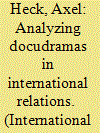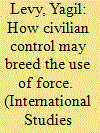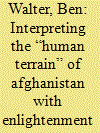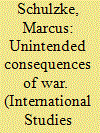|
|
|
Sort Order |
|
|
|
Items / Page
|
|
|
|
|
|
|
| Srl | Item |
| 1 |
ID:
156638


|
|
|
|
|
| Summary/Abstract |
In contemporary international relations, we are facing a lively discussion among scholars who are using all sorts of visual artifacts. Since representations of international politics in popular culture and mass media have been theorized more systematically, fictional films, TV series, as well as non-fictional documentaries have become relevant research objects. What is still missing is a conceptualization of the genre located between fictional and non-fictional film—docudrama. This genre is highly relevant for IR because many filmmakers have specialized in docudramatic depictions of historic events or more recent issues in international politics in which facts and fiction are combined into narratives about the events and the behavior of the people involved. But analyzing films is not unproblematic. Although a debate on the importance of film analysis in IR is occurring, methodological reflections have only just begun. Accordingly, this article draws on a film analytical methodology developed by Bordwell, which is applied to a docudrama about the Kunduz airstrike of September 2009.
|
|
|
|
|
|
|
|
|
|
|
|
|
|
|
|
| 2 |
ID:
156641


|
|
|
|
|
| Summary/Abstract |
This article is about a puzzle: strong civilian control of the military may promote the use of force not lessen it. Existing theories about civil–military relations and militarism do not adequately resolve this puzzle because they neglect the link between civilian control and the legitimacy to use force. The argument here is that an increase in the civilian control of the military may promote the use of force by legitimizing it under specific cumulative conditions: the existence of a previous militaristic infrastructure in the civilian political culture, which is triggered by an external event, and is augmented by three mechanisms deriving from civilian control that increase the legitimacy of using force by reducing deliberative decision-making. These three mechanisms are: (1) the depoliticization of the military caused by reinforcing civilian control, so the professional opinion of the military reigns supreme; (2) the militarization by inflating threats and setting ambitious war goals to remove such threats, which balances out the aversion to sacrifice for war that civilian control produces; and (3) the transition produced by civilian control to a volunteer, technology-intensive, downsized military that reduces the stake of citizens in military policies. The plausibility of this argument is explored by reference to the cases of the United States, Israel, and Russia.
|
|
|
|
|
|
|
|
|
|
|
|
|
|
|
|
| 3 |
ID:
156640


|
|
|
|
|
| Summary/Abstract |
In this paper I advance the proposition that Western policymakers’ perceptions and understandings of the conflict in Afghanistan are heavily influenced by certain political ideas emerging from seventeenth-century Enlightenment philosophy. This is particularly evident with counterinsurgency practitioners’ usage of social science disciplines to produce “objective” information about the local societies with which they are engaged. However, Enlightenment-inspired principles constrict practitioners’ perceptions of politics and political conflicts. These shortcomings are illustrated in both the form and content of policymakers’ efforts to gain “human intelligence” about Afghanistan’s social composition, and in the re-emergence of “human terrain” discourse. This blinkered viewpoint has left counterinsurgency practitioners unable to understand the United States’ own role in fueling Afghanistan’s conflictual dynamics.
|
|
|
|
|
|
|
|
|
|
|
|
|
|
|
|
| 4 |
ID:
156642


|
|
|
|
|
| Summary/Abstract |
This article traces the evolution of a postwar leitmotif of German foreign policy, Verantwortungspolitik (politics of responsibility), first articulated by Foreign Minister Hans-Dietrich Genscher in 1975. In its original Genscher formulation, Verantwortungspolitik emphasized several important features of German behavior on the world stage, including restraint, multilateralism, and humanitarianism. Since the end of the Cold War, German foreign policymakers have steadily revised and reimagined the leitmotif, stressing the importance of Germany’s international responsibilities and the need to close the gap between Germany’s power (capabilities) and willingness to assume a more prominent international role, including a readiness to use force, particularly when human rights are at stake. Although articulation of the norm is fairly persistent, its meaning has changed as Germany confronts new challenges on the global stage. This has important implications for how, where, and when Germany engages internationally and the instruments it utilizes to achieve its foreign policy objectives.
|
|
|
|
|
|
|
|
|
|
|
|
|
|
|
|
| 5 |
ID:
156639


|
|
|
|
|
| Summary/Abstract |
Although extensive research has been done on the causes of violence against civilians, it is usually directed at explaining why civilians are deliberately targeted or how militaries organize themselves in ways that lead soldiers to endanger civilians. As I show, many civilians are injured or killed by members of armed forces who strive to comply with the norms of war. Some attacks on civilians during ground combat operations in contemporary wars can be explained in terms of the tension soldiers experience between their indefeasible right of self-defense and their uncertainty about the identity and location of civilians on the battlefield. I illustrate this tension and explore its consequences by drawing on interviews with American and British veterans of the wars in Afghanistan and Iraq. This helps to explain the persistence of attacks on civilians even as the American and British armed forces make greater efforts to respect noncombatant immunity.
|
|
|
|
|
|
|
|
|
|
|
|
|
|
|
|
|
|
|
|
|